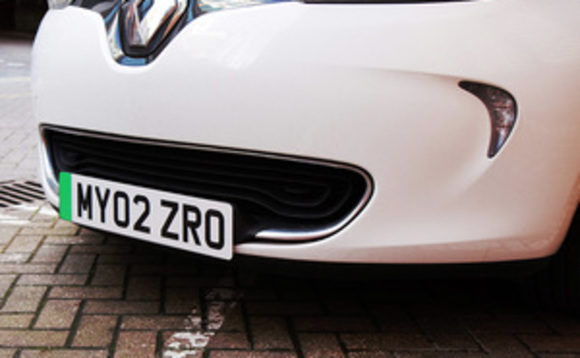UK’s first green number plates hit the roads
Green number plates are to appear on the UK’s roads for the first time from today, as the government looks to accelerate demand for zero emission vehicles ahead of the 2030 ban on the sale of new internal combustion engine cars and vans.
The plates will feature a green tag or ‘flash’ on the left hand side of the plate to make it easy to identify zero emission models. Only fully zero emission electric and fuel cell cars will be eligible for the green plates, with hybrids and plug in hybrids deemed ineligible.The green plates are voluntary, but they can be retrofitted to existing zero emission vehicles and are expected to be offered as standard on new fuel cell and electric vehicles (EVs) with customers invited to opt out if they do not want to have green plates.
The move has been introduced following a consultation over the summer which revealed widespread support for the idea and raised the prospect of EV drivers being able to access further incentives such as free parking or exemption from congestion and clean air charges in some cities.
Transport Minister Rachel Maclean said the move provided a further boost to the government’s ambitious transport decarbonisation plans and would support the new goal to end the sale of new petrol and diesel cars and vans in the UK by 2030.
“We are going further and faster than any other major economy to decarbonise transport, improving air quality in our towns and cities in the process and harnessing the power of clean, green technology to end the UK’s contribution to climate change by 2050,” she said. “Not only will green number plates raise awareness of the increasing number of cleaner vehicles on our roads, they could also unlock a number of incentives for drivers. It’s clear there has never been a better time to make the switch to a zero-emission vehicle.”
The new plates are part of a growing package of measures designed to accelerate the switch to electric vehicles.
Last month’s Spending Review confirmed the government would extend the Plug-in Grant scheme through to at least 2023 and also announced plans to invest £950m in rolling out EV charging hubs at every service station on England’s motorways and A-roads, £275m in charge point infrastructure at workplaces, homes, and on-street locations, and £90m in larger on-street charging schemes and rapid charging hubs.
The government also recently hosted the first ever meeting of ministers from the world’s largest car markets last month, to form a new Zero Emission Vehicle Transition Council designed to share best practices around the world.
And yesterday saw the official opening of the UK’s first Electric Forecourt from charging infrastructure provider GRIDSERVE, one of a number of companies pursuing ambitious plans to rapidly deploy fast charging infrastructure across the UK in support of the growing EV fleet.
The latest official sales figures from auto trade body SMMT revealed that sales of EVs last month were up 162 per cent compared to the 11 month period to November last year, during a period where sales of diesel and petrol cars slumped by 55 per cent and 39 per cent, respectively.
As the coronavirus lockdown shuttered showrooms around the country, hybrids and EVs were the only vehicle groups to witness an uptick in sales, according to the latest figures, with all-electric vehicles now comprising 5.8 per cent of all sales this year, up from 1.5 per cent this time last year.
Source: Business Green

